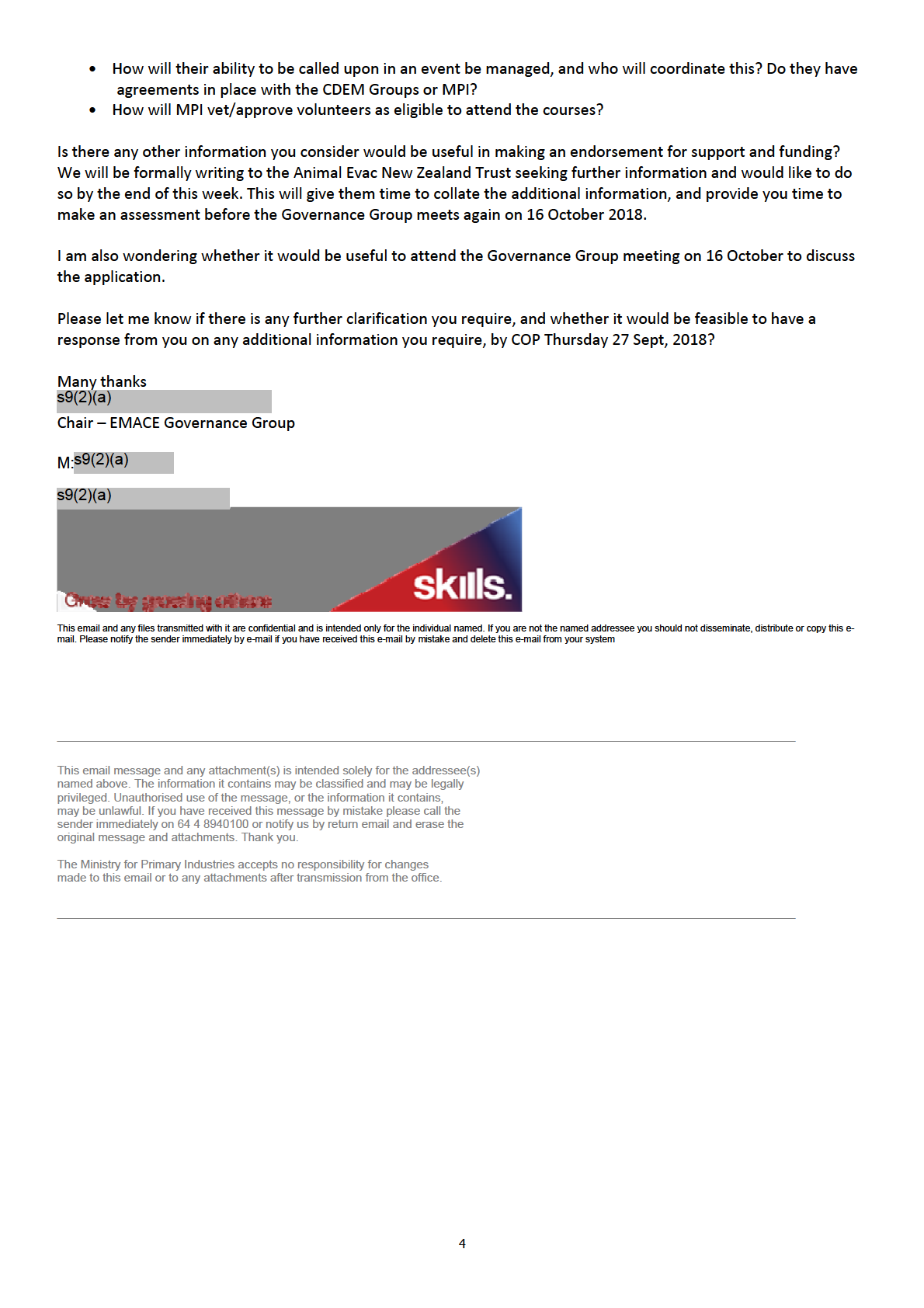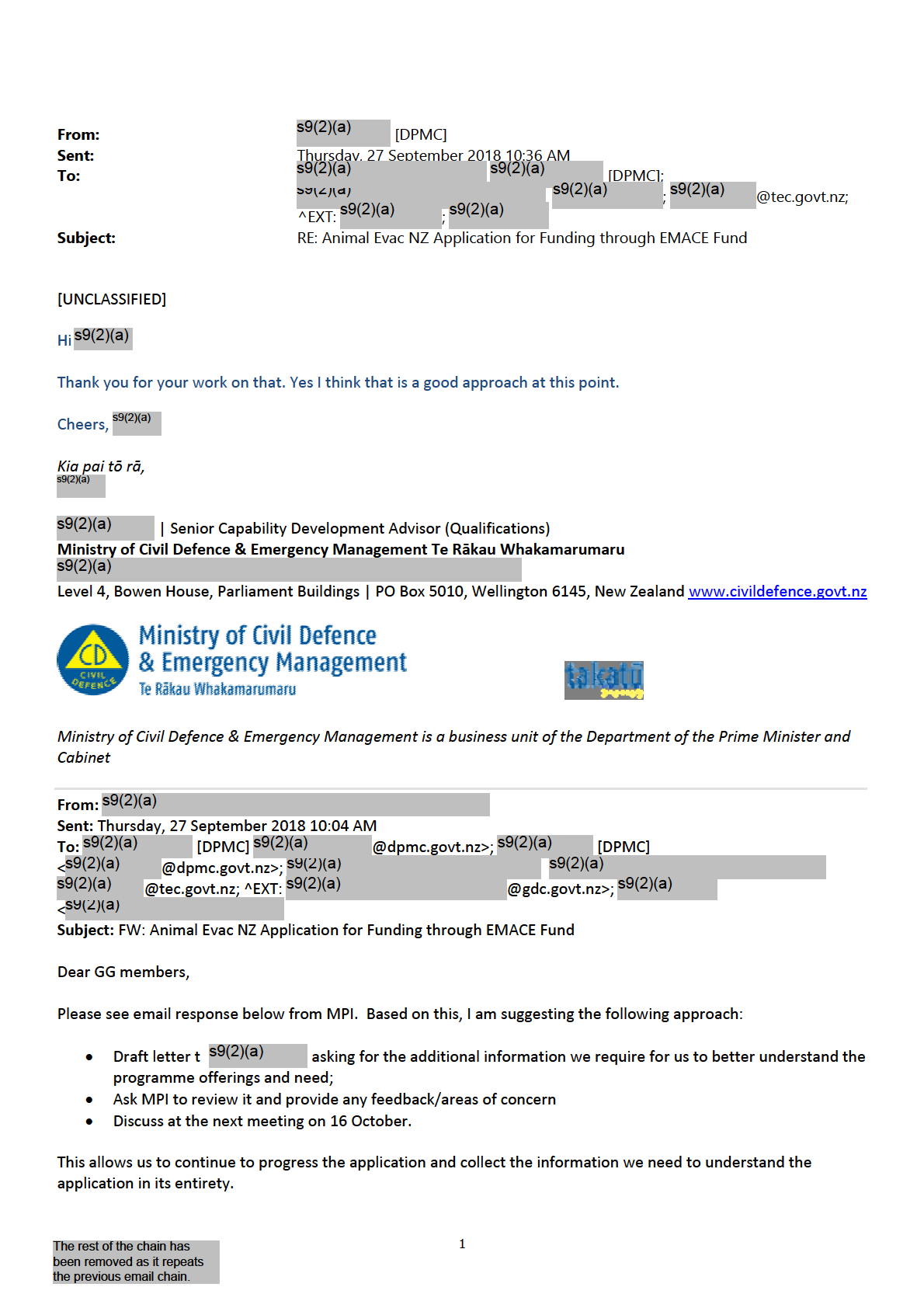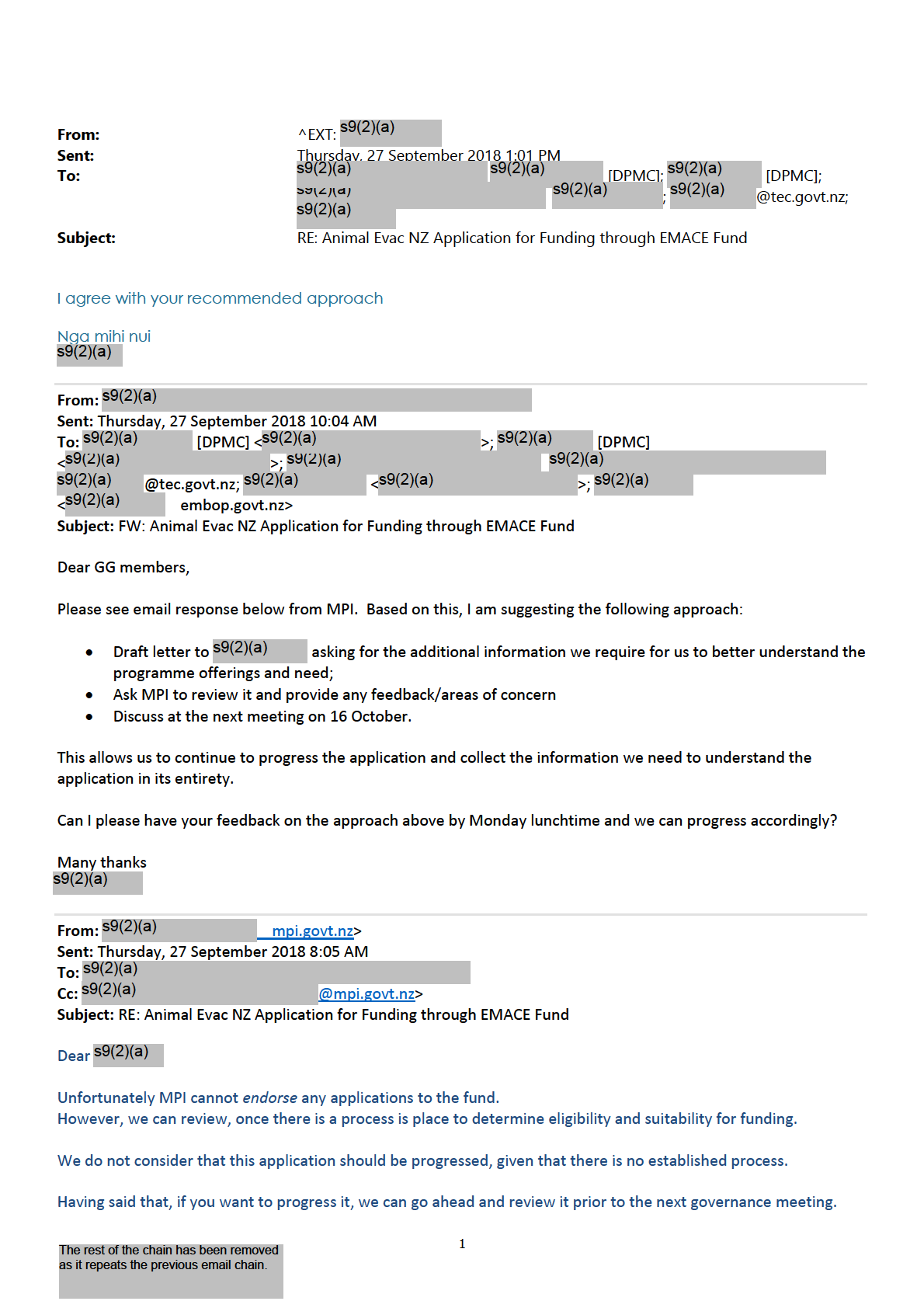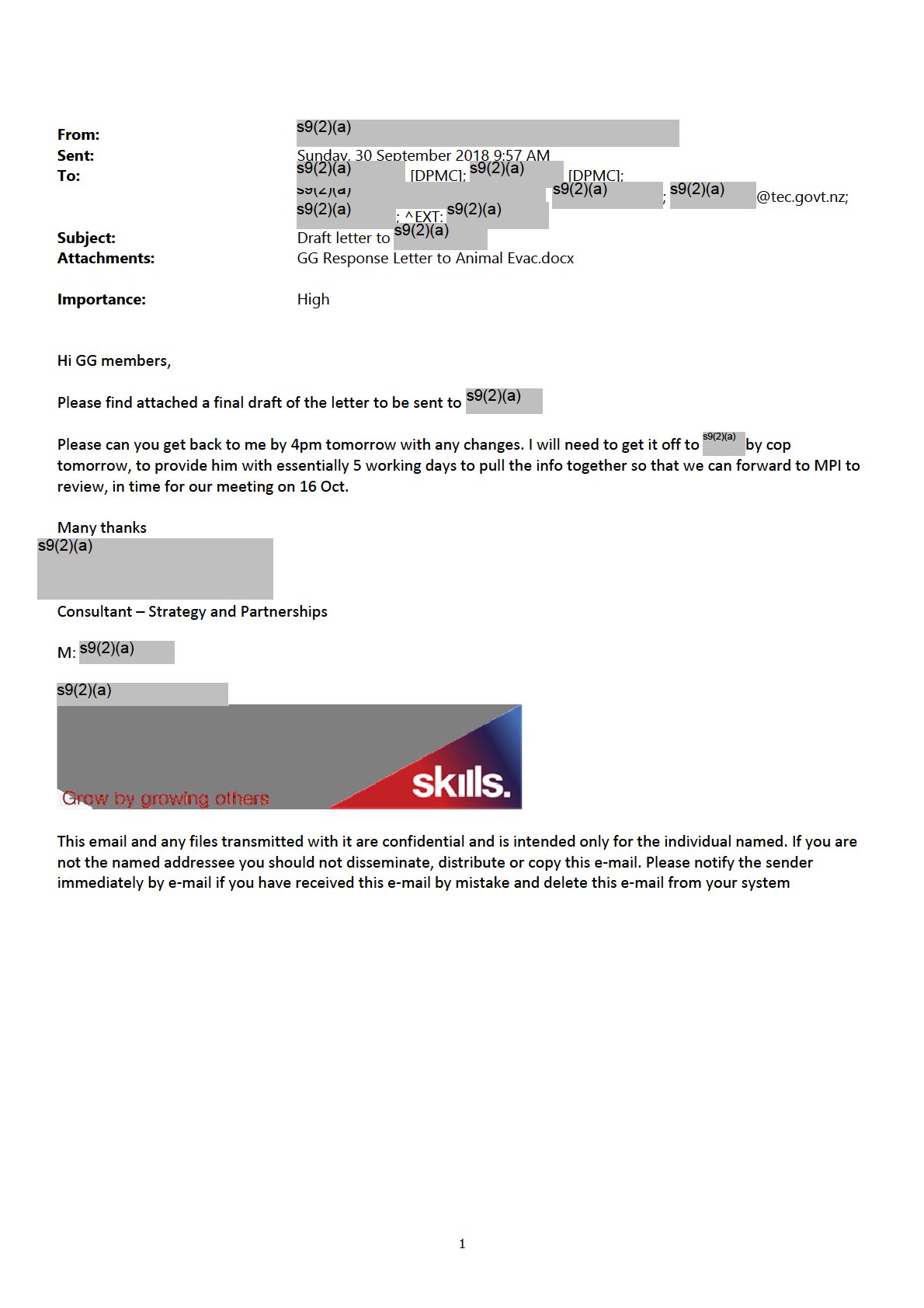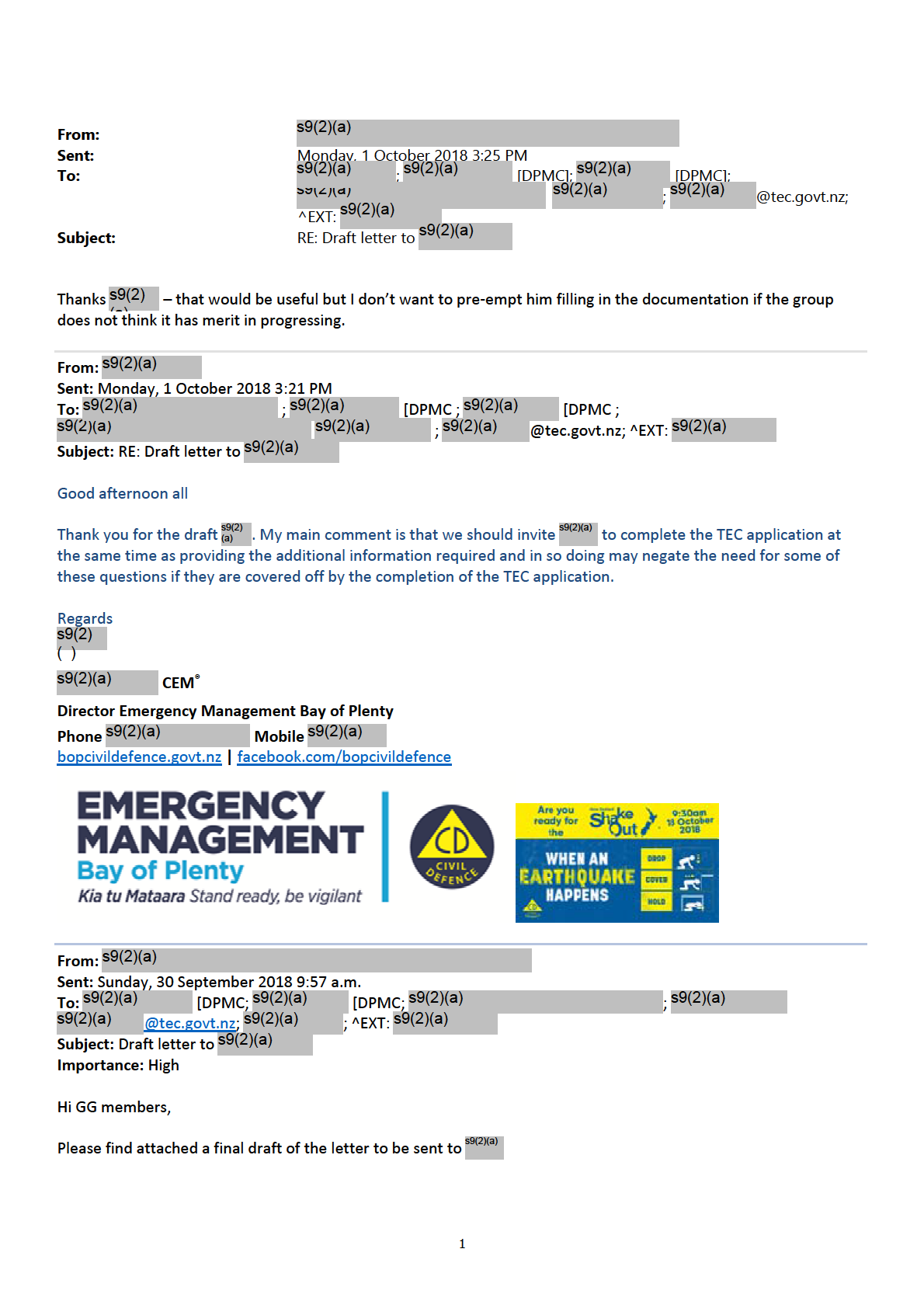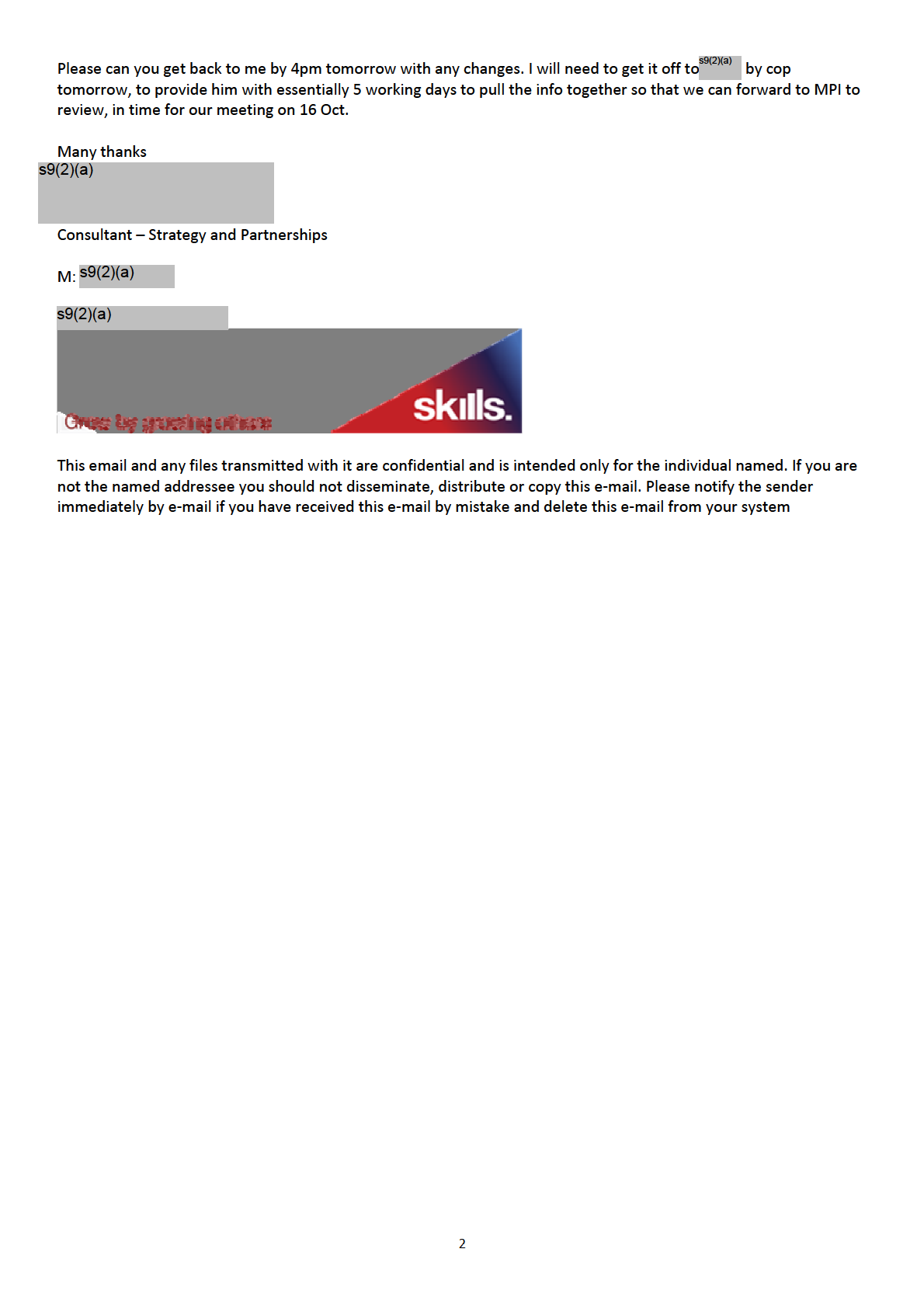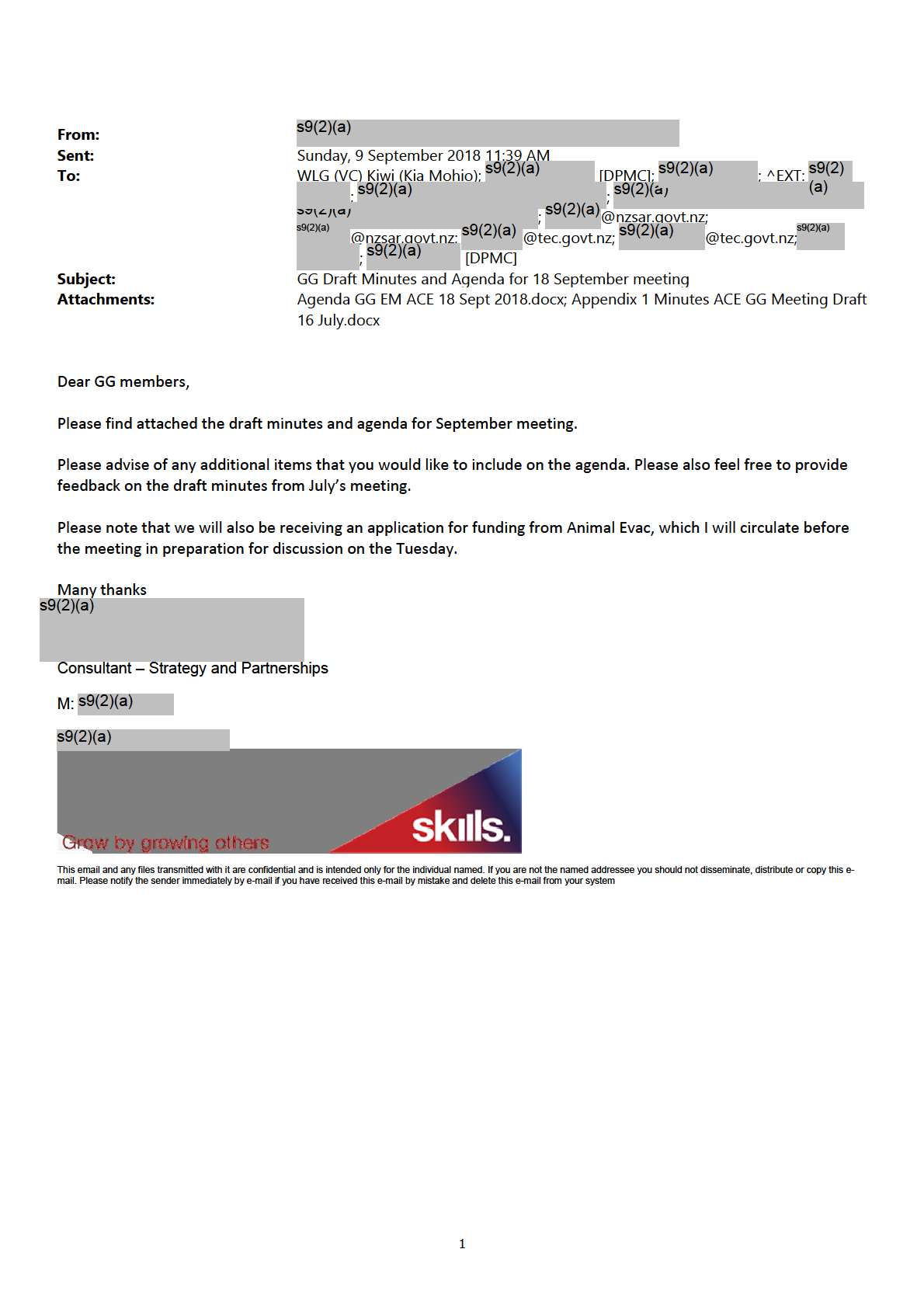
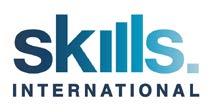
EM ACE GOVERNANCE GROUP MEETING
16 July 2018
EM ACE GOVERNANCE GROUP
1.1 Minutes – Governance Group Meeting 16 July 2018
Location: The Skills Organisation, Level 1 Wellington Chambers, 154 Featherston St, Wellington
Present:
s9(2)(a)
Skil s International (Chair)
Skil s Organisation
Ministry of Civil Defence & Emergency Management (MCDEM)
Ministry of Civil Defence & Emergency Management (MCDEM)
FENZ
Tertiary Education Commission
Bay of Plenty CDEM Group
1. Apologies
s9(2)(a)
(apologies).
Permission is sought to review the invitee list and consider whether representation is stil required from al
participants.
Actions:
1. s9(2)
(a)
to confirm this with invitees and update at next meeting.
2. Conflicts of Interest
No conflicts were declared
3. Minutes of the last meeting
MOTION: That the minutes of the meeting of 25 June 2018 be approved as a true & accurate record.
s9(2)(a)
- Carried
4. Provider Update and 2018 progress
MCDEM provided an update on the meetings they have had with the individual providers. At this stage no formal
reporting has been provided, except for s9(2)(b)
(ii)
There is a general under-delivery across the sector for the first
half of the year. Through the engagement with providers, several issues have been raised, including the
behaviour of some providers in soliciting enrolments outside of the EMACE volunteer and CDEM groups.
Additional issues raised include a range of ‘courses’ being offered, with significant credit values being delivered
in a short period of time. Courses also being advertised as ‘free’ suggests that the Governance Group is not
actively approving courses and training that meets the needs of the volunteer sector.
s9(2)(b)(ii)
application as an approved provider is progressing wel and approval is expected in the coming
month.
It was noted again that the inability of the governance group to ‘control’ the behaviour of provider, particularly
where TEC funds are being used to train individuals who have not been approved or recommended by the CDEM
groups was frustrating and of concern. This coupled with the lack of reporting of what was being reported and
where has made it difficult for the group to monitor and agree whether the needs of the industry were in fact
being met. The group raised this concern directly with TEC and asked for TEC to take a lead on the conversations
of reporting and monitoring with providers directly.
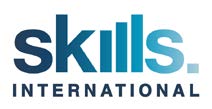
EM ACE GOVERNANCE GROUP MEETING
16 July 2018
Actions:
1. TEC to speak with the providers directly about the behaviour of soliciting students that were not
deemed volunteers by CDDEM groups and to report back at the next September meeting.
2. s9(2)(a)
wil continue to meet with CDEM groups and providers to gain greater clarity on the needs of
the sector and provide a translation between what is available currently through the existing NZQA
framework, and to assess opportunities for need not currently being service.
5. 2019 Funding and Alternative Approaches
There was discussion on the interactions with the Ministry of Education and the broad options to be
considered. There was a lack of clarity on the recommended outcomes of the review. The group
acknowledged that there was an inability to engaged with providers on 2019 funding al ocations due to the
lack of clarity in the mechanism.
Some of the group also raised concern at the lack of consultation by MoE with respect to the review.
The group agreed that it needed to prepare for the possibility of either option being recommended – either
a refined status quo, in which case, providers would need to be engaged in September with
recommendations made to TEC in time for a November board meeting. It was recommended that at the
September meeting a decision needed to be made about an approach to engagement with providers.
The group also discussed ongoing issue of how the existing 159 L could be implemented to enable funding
to flow to employers and community groups who also do not need to use the NZQA quality assurance
requirements/frameworks. It was acknowledged that this could enable training needs such as psychosocial
emotional training for volunteers and other training that does not require national y recognised
qualifications/unit standards. The response from MoE confirmed that the policy intent was there, but that
the TEC operational funding rules did not enable the policy.
6. Inbound Correspondence
None
7. Update from FENZ GTE –s9(2)(a)
No update
8. Update from MCDEM – s9(2)(a)
No update.
9. Update from TEC – s9(2)(a)
10. Monthly reporting
Only s9(2)(b)
(ii)
has provided reporting for the month. Appear to be largely on track.
11. General Business
No further General Business was raised.
12. Close
13. Next Meeting – face to face or conference cal Tues 18th September 1-3pm.
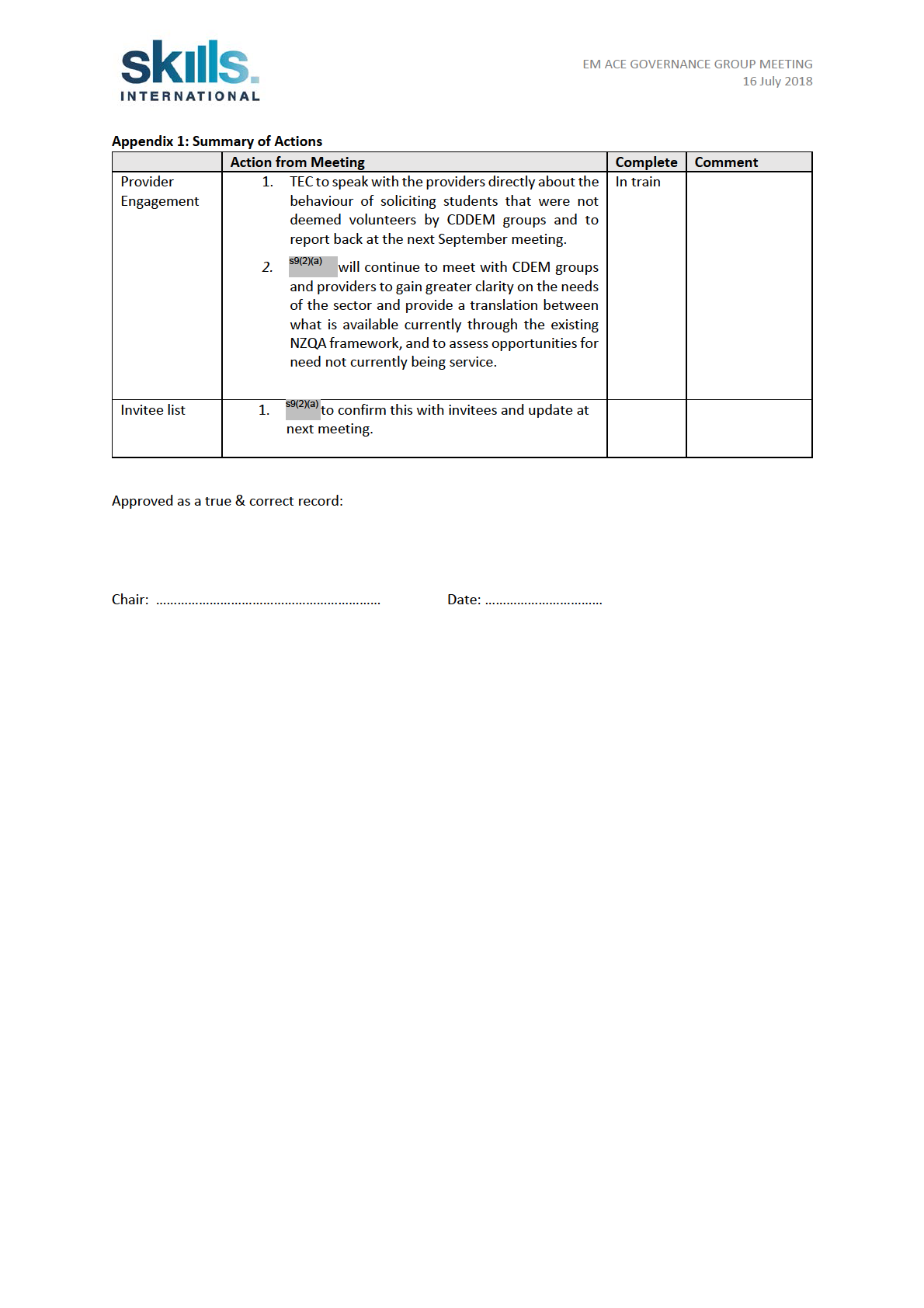
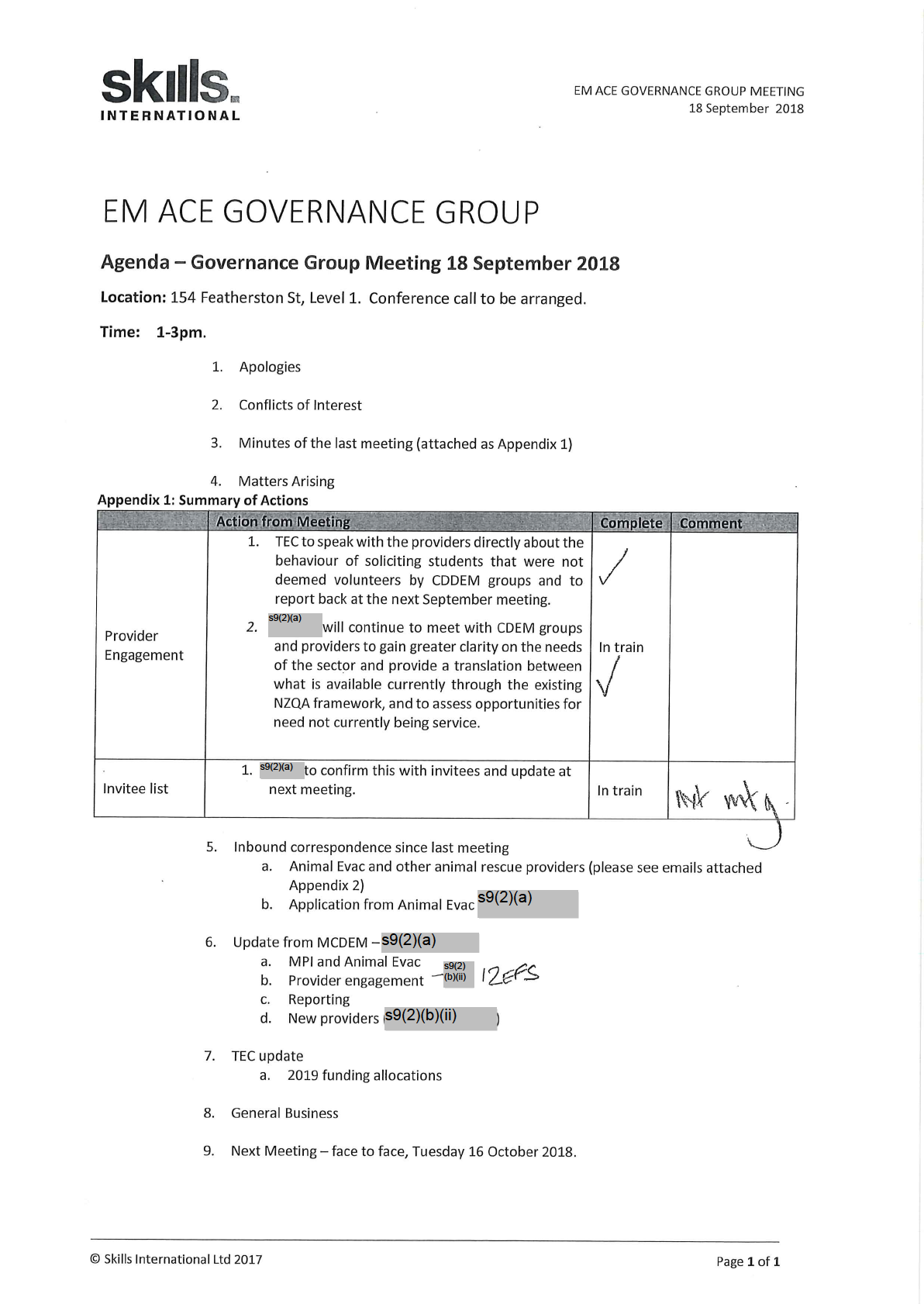
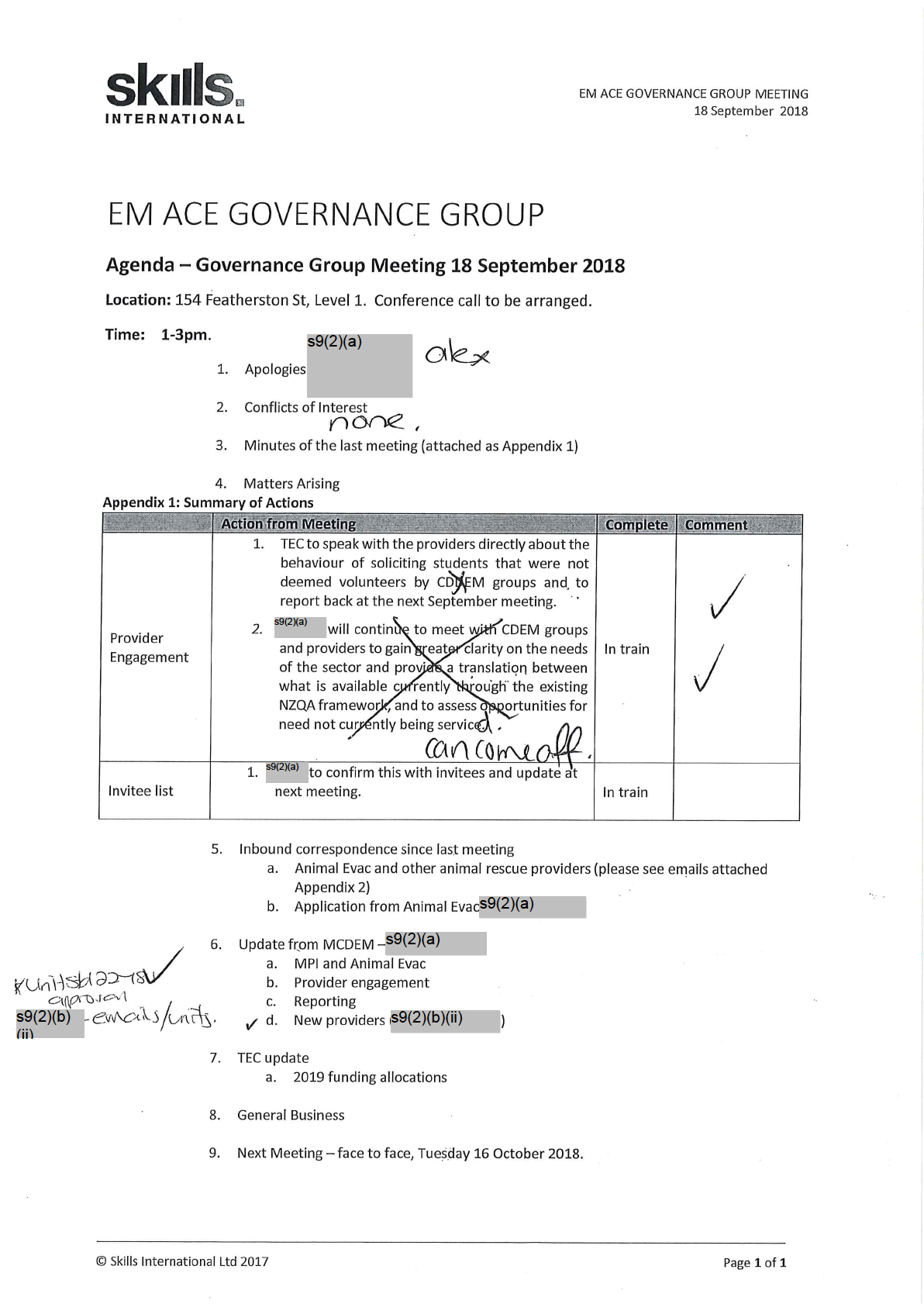
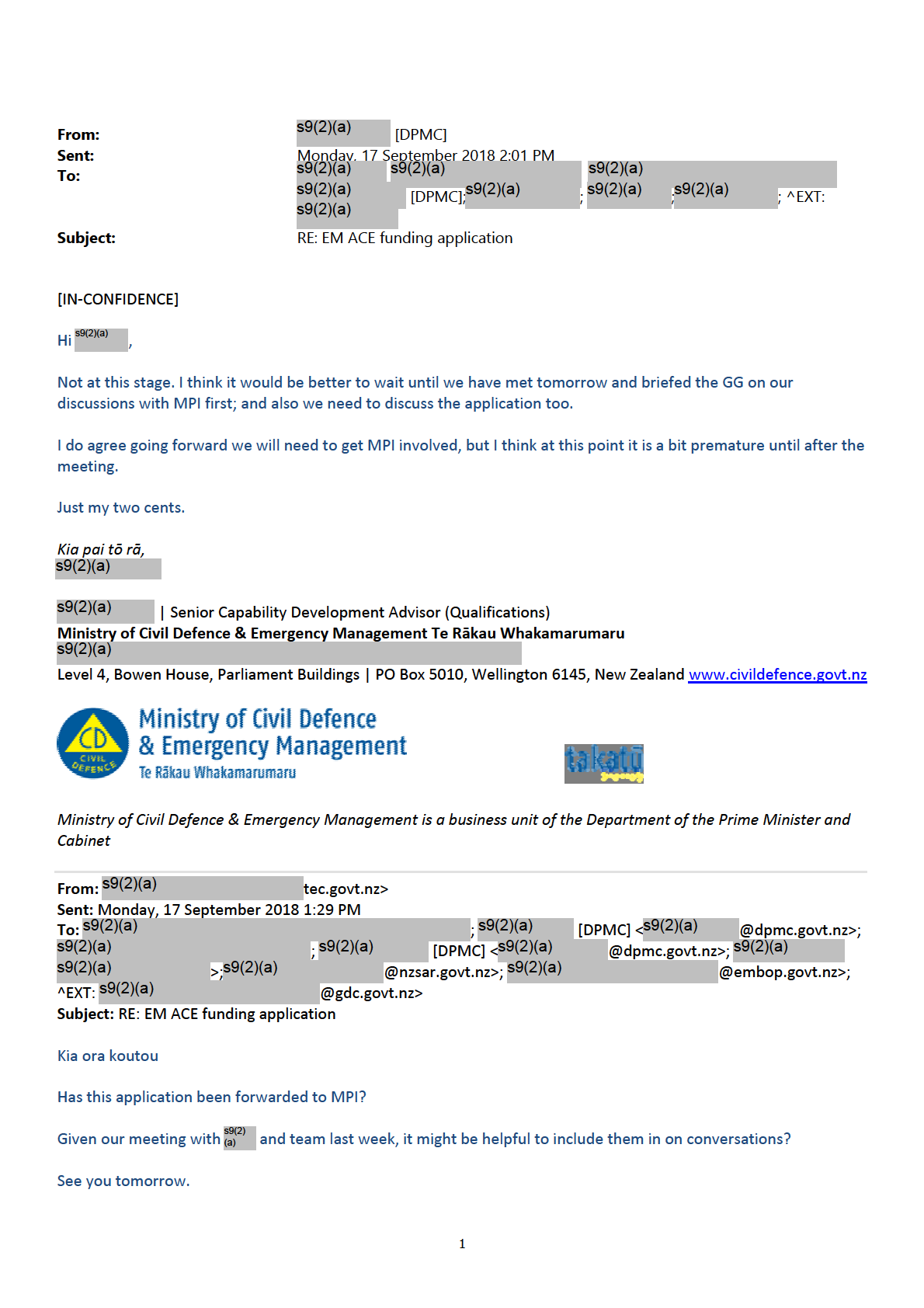


s9(2)(a)
Senior Advisor
PTE/ITP and CE Investment
s9(2)(a)
PO Box 27‐048, Wellington 6141, New Zealand
www.tec.govt.nz
From: s9(2)(a)
Sent: Friday, 14 September 2018 2:52 PM
To: Patrice Nilsen [DPMC] <s9(2)(a)
>; s9(2)(a)
;
s9(2)(a)
; s9(2)(a)
; s9(2)(a)
nzsar.govt.nz>;
s9(2)(a)
@embop.govt.nz>; s9(2)(a)
s9(2)(a)
@tec.govt.nz>
Subject: FW: EM ACE funding application
Importance: High
Hi team
Please see application attached from Animal Evac for discussion on Tuesday
Cheers
s9(2)(a)
From: s9(2)(a)
Sent: Friday, 14 September 2018 8:36 AM
To: s9(2)(a)
Cc: s9(2)(a)
Subject: EM ACE funding application
Importance: High
Hi s9(2)(a)
As discussed, here is our application for EM ACE funding.
Kind regards
s9(2)(a)
s9(2)(a)
MEmergMgt PGDipEmergMgt CertAWI CEM®
Chairman & Co‐Founder
Mobile s9(2)(a)
Animal Evac New Zealand Trust | Kararehe Whakawatea
Protecting animals in disaster
2

 Donate at http://www.animalevac.nz
Donate at http://www.animalevac.nz
Animal Evac New Zealand (Trust) is a registered charitable trust under the Charitable Trusts Act 1957.
3
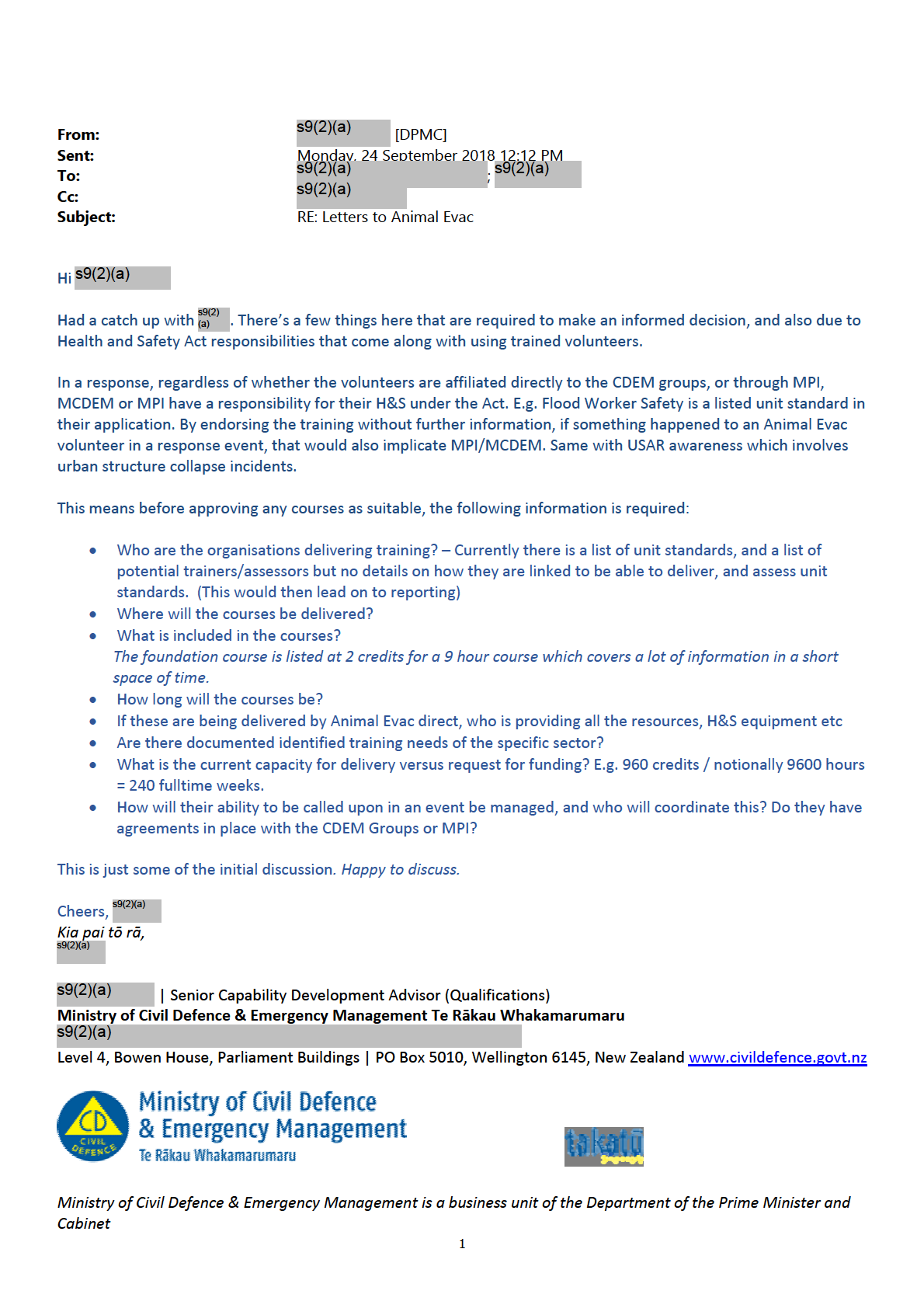

 From:
From: s9(2)(a)
Sent: Monday, 24 September 2018 9:36 AM
To: s9(2)(a)
tec.govt.nz>; s9(2)(a)
dpmc.govt.nz>
Cc: s9(2)(a)
Subject: RE: Letters to Animal Evac
Hi s9(2)(a)
Lets pencil in 1.30pm I maybe running a few minutes late……where would be good? Up at the coffee shop next to
TEC – forget what its called…
From: s9(2)(a)
Sent: Monday, 24 September 2018 9:26 AM
To: s9(2)(a)
[DPMC] <s9(2)(a)
>; s9(2)(a)
Cc: s9(2)(a)
Subject: RE: Letters to Animal Evac
s9(2)(a)
Awesome, thanks
s9(2)(a)
Senior Advisor
PTE/ITP and CE Investment
s9(2)(a)
PO Box 27‐048, Wellington 6141, New Zealand
www.tec.govt.nz
From: s9(2)(a)
[DPMC] s9(2)(a)
Sent: Monday, 24 September 2018 9:21 AM
To: s9(2)(a)
tec.govt.nz>; s9(2)(a)
Cc: s9(2)(a)
Subject: RE: Letters to Animal Evac
[UNCLASSIFIED]
Good Morning All,
s9(2)(a)
I am having a quick catch up with
@ MPI this morning to brief her and discuss from a MCDEM/MPI perspective.
s9(2)(a)
I will send through the considerations after this.
s9(2)(a)
Thanks,
Kia pai tō rā,
s9(2)(a)
s9(2)(a)
|
Senior Capability Development Advisor (Qualifications)
Ministry of Civil Defence & Emergency Management Te Rākau Whakamarumaru
s9(2)(a)
Level 4, Bowen House, Parliament Buildings | PO Box 5010, Wellington 6145, New Zealand www.civildefence.govt.nz
2



 Ministry of Civil Defence & Emergency Management is a business unit of the Department of the Prime Minister and
Ministry of Civil Defence & Emergency Management is a business unit of the Department of the Prime Minister and
Cabinet
From: s9(2)(a)
tec.govt.nz>
Sent: Friday, 21 September 2018 12:37 PM
To: s9(2)(a)
Cc: s9(2)(a)
s9(2)(a)
[DPMC] s9(2)(a)
Subject: RE: Letters to Animal Evac
Kia ora s9(2)(a)
Thanks for your email. s9(2)(a)
Great you have caught up on last week’s Governance Group meeting. I’m happy to draft some ideas for comms to
MPI and Animal Evac Trust. Can I please confirm the following approaches:
MPI – I understand we are requesting MPI assess the funding application from Animal Evac Trust as the parent org
for animal welfare agencies. Will the Governance Group advise on the assessment criteria or will MPI use their own?
Animal Evac Trust – We will respond requesting further information for the Governance Group.
s9(2)(a) would you mind emailing some of the information that MCDEM would like MPI to consider when assessing
the application? I’m thinking broad areas that we would ask any of your partner orgs to consider when assessing an
application from a body within their scope of responsibility. E.g. Training needs of the specific sector, current
capacity, distribution of capacity, ability to be called upon in an event, or anything else MCDEM would deem
necessary.
s9(2)(a) Monday would be best for me as Tues is looking a little busy. Would 1.30pm suit you?
Speak soon
s9(2)(a)
Senior Advisor
PTE/ITP and CE Investment
s9(2)(a)
PO Box 27‐048, Wellington 6141, New Zealand
www.tec.govt.nz
From s
9
Sent: Friday, 21 September 2018 10:21 AM
To: s9(2)(a)
tec.govt.nz>
Cc: s9(2)(a)
s9(2)(a)
[DPMC] s9(2)(a)
Subject: Letters to Animal Evac
s9(2)(a)
Hi
3
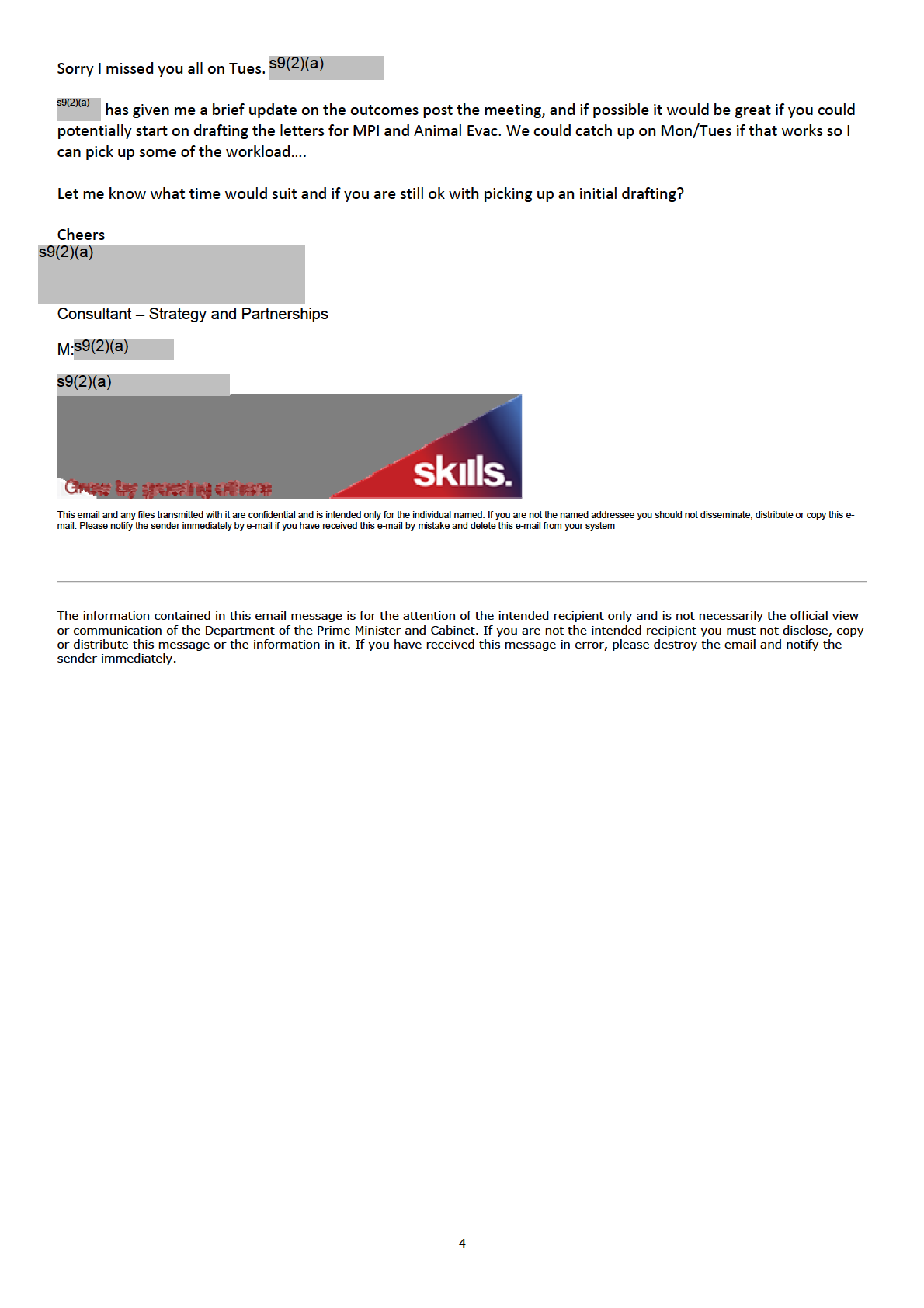
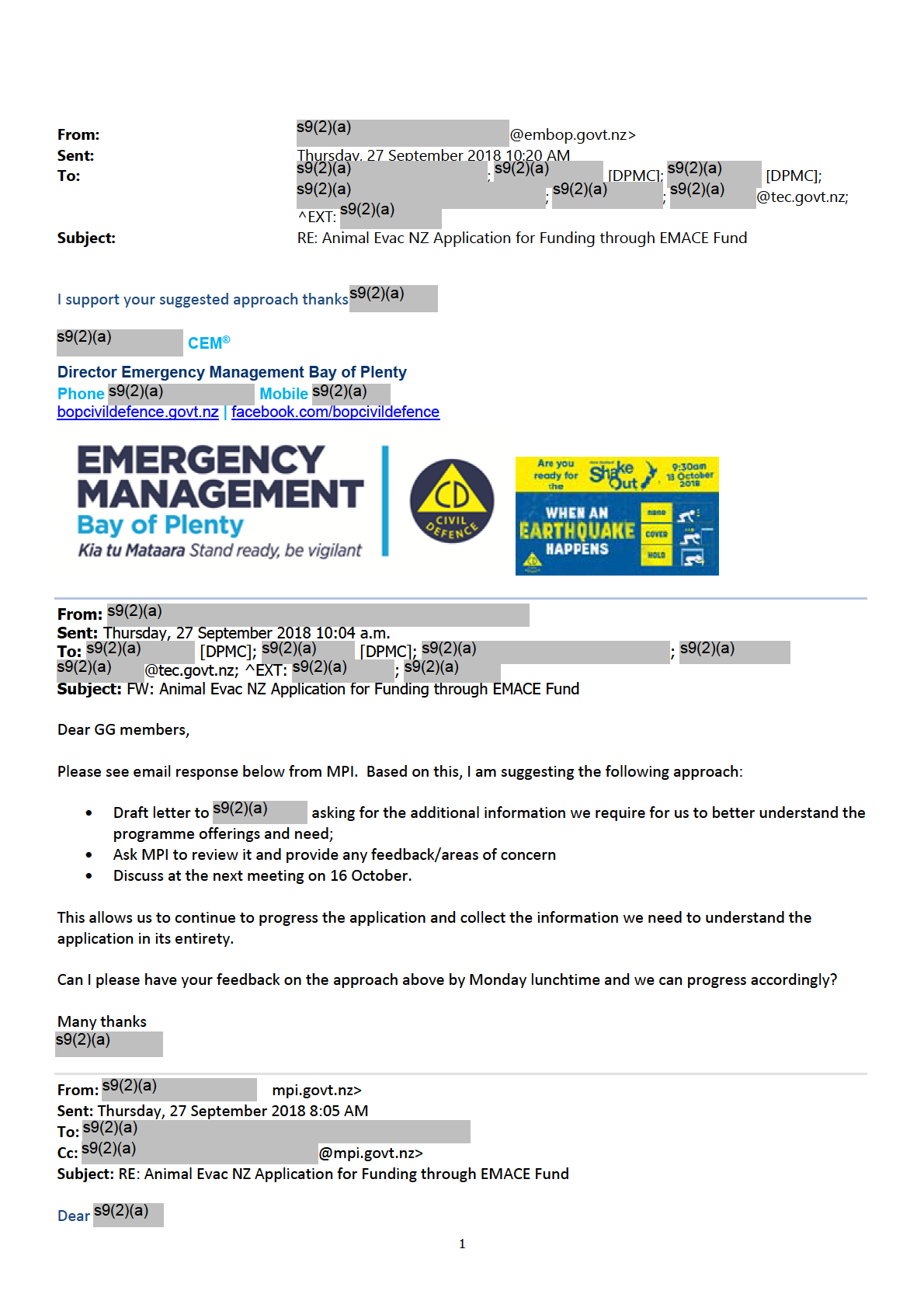
Unfortunately MPI cannot
endorse any applications to the fund.
However, we can review, once there is a process is place to determine eligibility and suitability for funding.
We do not consider that this application should be progressed, given that there is no established process.
Having said that, if you want to progress it, we can go ahead and review it prior to the next governance meeting.
We would need the complete application and any additional material sent to s9(2)(a)
and s9(2)(a)
,
s9(2)(a)
and s9(2)(a)
They can assign to our team for review.
I’m on sick leave from today until 15 October.
I am available to attend the governance meeting at this stage, if that is still an option.
I understand that Animal Evac will be unable to report, and that this will mean they are not able to receive the
funding? If this is the case, it would seem sensible to alert s9(2)(a)
to this situation, as part of your response this
week?
My colleague s9(2)(a)
is available early next week and will also endeavour to get back to you on the below
list of questions.
Some feedback from me follows – I’ve reordered and added some questions
The need for funding / what is the gap
Is there a documentation to support the need for this training (training for animal rescue)
Are there documented competencies or training needs of the specific sector?
What will the course achieve / how will the funding body and lead agency know outcomes have been achieved
How will the reporting methodology be used for funding accountability?
Is there an expectation that trained volunteers maintain their currency of knowledge/skills over time and
how will this occur?
Please provide any documentation to support relationships with CDEM Groups, or other documentation
showing how volunteers will be used, and operate in an event/incident
How will their ability to be called upon in an event be managed, and who will coordinate this?
Are there plans to vet / approve volunteers as eligible to attend the courses, eg vetting by MPI or CDEM
Groups or an independent agency
Providers and trainers
Who are the organisations delivering training?
How will the organisations deliver and assess the training (including who is providing all the resources, who
the trainers/assessors are; how will unit standards identified in the application be reported to NZQA, H&S
equipment etc)?
What is the current capacity for delivery versus request for funding?
Details on the courses
How will training quality be managed to ensure national consistency?
Where will the courses be delivered?
What is included in the courses?
How long will the courses be?
Details on the content
s9(2)(a)
Please provide course material for review
– is this a requirement for other groups applying for the funding?
Thanks]
Many thanks
s9(2)(a)
s9(2)(a)
PhD | Manager Animal Welfare Team
2
Animal Health & Welfare | Regulation & Assurance Branch
Ministry for Primary Industries | Pastoral House 25 The Terrace | PO Box 2526 | Wellington | New Zealand
Telephone s9(2)(a)
| MPI tel: 0800 00 83 33 | Mobile s9(2)(a)
| Web: www.mpi.govt.nz
Follow MPI on Twitter (@MPI_NZ)
From: s9(2)(a)
Sent: Tuesday, 25 September 2018 3:25 PM
To: s9(2)(a)
mpi.govt.nz>
Subject: Animal Evac NZ Application for Funding through EMACE Fund
Importance: High
Hi s9(2)(a)
My name is s9(2)(a)
Chair of the EM ACE Governance Group, and lead contact for Skills
International, the Co‐ordination Body for the EM ACE fund.
Apologies for not making it to the meeting scheduled for 13 Sep 2018. There was some confusion about whether or
not I needed to attend. In hindsight, as the lead for the Co‐ordination Body with delegation for recommendations to
TEC, it was probably a meeting I should have attended.
I have spent the last few weeks coming up to speed with all the correspondence between yourself, MCDEM and TEC
about funding for volunteer training for animal welfare in emergencies. This email is to formally acknowledge the
correspondence, and to confirm my understanding that the National Civil Defence Emergency Management Plan,
2015 sets out the guiding principles and roles and responsibilities for CDEM across the 4R’s at the national
level. And the Plan states MPI’s role is one of a support agency as outlined in the National Civil Defence Emergency
Management Plan, 2015. This means in the event of an emergency, MCDEM would be the lead agency, engaging
with you as the agency responsible for:
a. co‐ordinating the provision of the animal welfare services sub‐function (including animal rescue, animal
shelter, food, water, husbandry, and veterinary care and other essentials) for animals, including companion
animals, production animals, animals in research, testing and teaching facilities, zoo and circus animals, and
wildlife; and
b. co‐ordinating the planning for animal welfare in emergencies; and
c. maintaining the Government’s reporting and advisory capability on animal welfare in an emergency.
In light of this role it is my understanding we require you, as the agency responsible for animal welfare in
emergencies, to determine the competencies volunteers require and assess the funding application we have
received from the Animal Evac New Zealand Trust. The Co‐ordination Body requires you to endorse the application
in order for the Governance Group to make a recommendation to TEC for funding.
As part of your assessment of an application that seeks EM ACE funding for volunteer training in the animal welfare
sector, can you confirm you would require the following information:
Who are the organisations delivering training?
How will the organisations deliver and assess the training (including who is providing all the resources, who
the trainers/assessors are; how will unit standards identified in the application be reported to NZQA, H&S
equipment etc)?
How will training quality be managed to ensure national consistency?
How will the reporting methodology be used for funding accountability?
Where will the courses be delivered?
What is included in the courses?
How long will the courses be?
Are there documented competencies or training needs of the specific sector?
Is there an expectation that trained volunteers maintain their currency of knowledge/skills over time and
how will this occur?
What is the current capacity for delivery versus request for funding?
3
